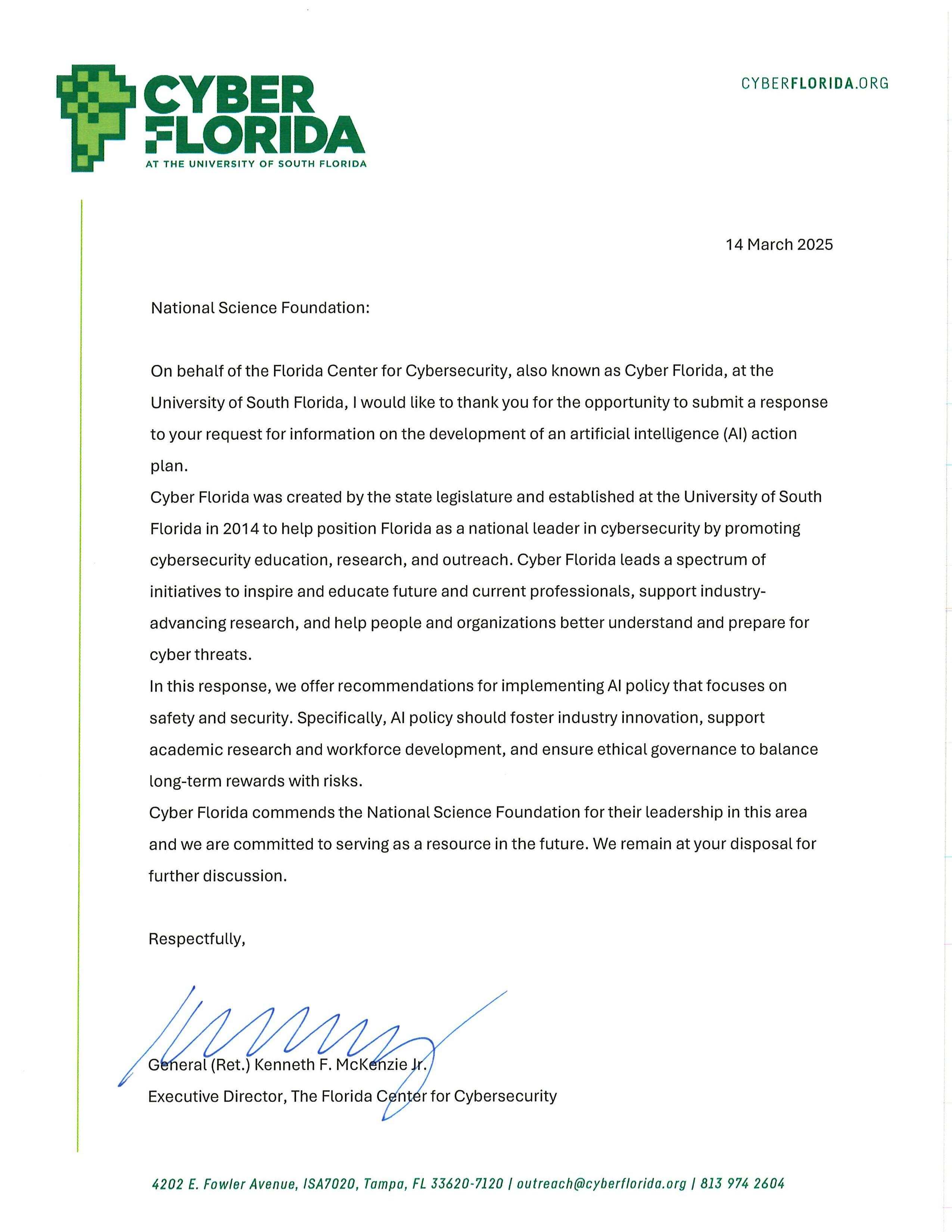
FEDERAL REGISTER 2025-02305





FEDERAL REGISTER 2025-02305



The Florida Center for Cybersecurity (also known as Cyber Florida) was established at the University of South Florida in 2014 under Florida statute 1004.444. The goals of the center are to: position Florida as a national leader in cybersecurity and its related workforce through advancing and funding education, research, and development initiatives in cybersecurity; assist in the creation of jobs in the state’s cybersecurity industry and enhance the existing cybersecurity workforce; act as a cooperative facilitator for state business and higher education communities to share cybersecurity knowledge, resources, and training; seek out research and development agreements and other partnerships with major military installations to assist, when possible, in homeland cybersecurity defense initiatives; attract cybersecurity companies to the state with an emphasis on the defense, finance, health care, transportation, and utility sectors.
Cyber Florida is eager to provide comments to the National Science Foundation on the development and implementation of a safe, effective AI action plan.
The Office of Science and Technology Policy’s (OSTP) request for AI policy comments is timely, given rapid artificial intelligence (AI) innovation in both academia and industry. Looking back at the Executive Order (EO) 14179, removing the ‘barriers’ to American leadership in AI is commendable, as the implications and impacts of AI will inevitably reach most, if not all, spaces in our country. However, it would be prudent to consider why EO 14110 was enacted in the first place. Those in the development of AI can attest to the considerations that are made, utilized, or deferred for the necessary deployment of these technologies. While the highest priority actions should certainly include ways minimize the barriers to AI innovations, the current administration should also consider that the foundations of AI are rooted in safety and security tradeoffs that are made by developers. America’s AI dominance to promote economic competitiveness and success must also consider that policy actions need to include governance policies that promote doing so with national security in mind. This comment provides considerations for policy from the industry, academia and governance views.
Industry would be most in favor of reduced regulations, as this propels their ability to advance AI work. This is a function and necessity of our capitalist America, where progress is necessary for dominance. For instance, the markets were upturned earlier this year with the DeepSeek announcement of methods that were more resource-efficient and would reduce the reliance on large company servers and GPUs. This has spurred other companies to follow suit and utilize more efficient means for their AI models (Heaven, 2025). However, one of the most incidental considerations for this Chinese company was the availability of cheap labor and ability to allow the models to train iteratively. To lead in AI, America needs collaborative industry efforts and support for diverse AI development, beyond competing monopolies. The removal of any regulatory frameworks is akin to removing highway barriers—it is a recipe for chaos. Considering the data security measures, unique risks to the different sectors (e.g., banking, healthcare, proprietary models), and potential threats to hardware and data centers, a system must promote some measures of safety for national security purposes. In addition to that, industry should support nontraditional avenues to research, develop and build AI models and technologies, such as evidenced in academia.
Academia is at the forefront of AI advancement. Educational institutions have stayed in step with industry, exploring AI and the various topics ranging from critical infrastructures to hardware and energy considerations, to implications for national security and governance. In addition to AI advancement, academia is cultivating the next generation of talent in this space. The next generation of America’s workforce will inevitably have to utilize AI in some way, and resistance will only hinder the current administration’s efforts to make America an AI force in the world. Much of academia has answered the call to understand and utilize AI, with mini-certifications, colleges dedicated to AI, Cybersecurity & Computing, and more research and development funding funneled into this sphere (Freeman, 2024). The current administration has the opportunity to lean on and leverage academia as partners in this bid to propel America as a leader in the AI space, by supporting academic efforts to build the next generation of the workforce, develop innovative research and technological advancements in AI, and do all that in line with the necessary considerations of how it will impact our country in the long run. Continued support for multidisciplinary work in this field (e.g., through National Science Foundation or Defense Advanced Research Projects Agency) would
ensure that our country’s AI capabilities and resources continue to proliferate. Additionally, promoting public-private partnerships would be of benefit to both industry and the government, as education serves as an arm of the future of our country through workforce development and education. Along with technical emphasis on the intricacies of AI, it is necessary to also promote education and digital literacy efforts, as well as its ability to revolutionize other areas of study, such as business, medicine, the natural world, and others.
Lastly, governance is a critical and often an understated consideration that must be made, as there are both expected and unexpected detriments to the engagement of AI in all areas of our society. While this new technology has inevitably impacted daily lives, the continued growth of AI and its success in making America a leader in the space hinges on its ability to be accepted in daily lives of Americans. AI can enhance government efficiency and benefit Americans, aligning with the administration’s goals—however, public perceptions and acceptance of AI in governance must be considered and aligned with this progress. A significant amount of research has identified that comfortability with AI, perceptions of its potential use, and data safety considerations, are all a part of this (Yigitcanlar et al., 2023). While the administration should continue to encourage the growth and development of AI in industry and academic spaces, it should also consider its role as the steward of this technological advancement, by keeping the public informed and aware of the updates and benefits to AI in governing systems, as well as provide oversight on the ethical considerations of AI that are inevitable and will impact adoption.
AI has the potential to not only serve as a tool to revolutionize our economy, but also how we assess risk, make safety and defense decisions, increase productivity, evolve our workforce and enhance government efficiency. But to achieve this, it is critical that policy is forward-thinking on all fronts—the fostering of industry advancements of these technologies; the advancement of research and workforce development for the next generation; and the creation of policy decisions that balance the long-term rewards with the risks. Based on the comments above, we offer the below policy action recommendations that the current administration should consider, emphasizing the three sectors that are and will continue to be the most influential in the promotion of American dominance in the AI space. While some of these include funding considerations, others consider fostering collaborative opportunities to engage various sectors across our nation that will inevitably be impacted in this new technological age.
• Reduced regulatory measures that limit incubation of new AI innovations
• Support for AI development beyond the major competing monopolies
• Collaboration between industry and academia for research and development
• Public-private partnerships that support education and workforce development of AI-savvy next generation
• Continued support for multidisciplinary AI research
• Promotion and participation in public-private partnerships with industry for AI research and development
• Emphasis on AI education and digital literacy
• Integration of AI into the various fields of study
Governance
• Oversight on the ethical considerations of AI use for safety and security of American citizens
• Public awareness and education on AI use in governance
• Consideration of the long-term risks of AI along with the rewards
• Consideration of how public perceptions and acceptance of AI will impact long-term success and integration into our society
References
How DeepSeek ripped up the AI playbook—and why everyone’s going to follow it | MIT Technology Review
https://www.usf.edu/news/2024/usf-plans-to-launch-college-focused-on-artificial-intelligence-cybersecurity-and-computing.aspx
Yigitcanlar, T., Li, R. Y. M., Beeramoole, P. B., & Paz, A. (2023). Artificial intelligence in local government services: Public perceptions from Australia and Hong Kong. Government Information Quarterly, 40(3), 101833.
Author
Ratna B. Dougherty, PhD
Assistant Professor, School of Public Affairs
University of South Florida
Contact Information
Ernie Ferraresso eferraresso@cyberflorida.org 813 974 1869
Director Cyber Florida